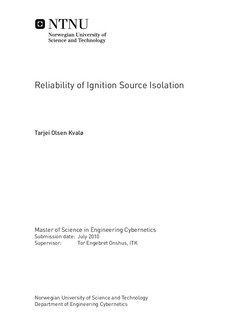Reliability of Ignition Source Isolation
Master thesis
Permanent lenke
http://hdl.handle.net/11250/260206Utgivelsesdato
2010Metadata
Vis full innførselSamlinger
Sammendrag
This thesis work was a study into how the effectiveness of ignition source isolation can be estimated. This safety system works by isolating electrical equipment from power when flammable gas is detected on oil and gas installations. Improving the understanding of how effective this system actually is at reducing explosion risk in hazardous areas was the main motivation, as this could help operators and authorities form a more accurate risk picture. The main part of the work is the development and discussion of a model for ignition that was made so that it could be used to estimate this effectiveness. A detailed model is presented first, based on evaluating failure modes of equipment, then suggestions are made for how it could be simplified to be of practical use in risk analysis. The second part of the project was to gather enough data from industry sources to be able to estimate key parameters in the model relating to the failure probability of Ex barriers and the ignition probability resulting from common types of process equipment. Not enough data was found to support a quantification of these parameters, but results from a major maintenance project on an oil and gas installation in the Norwegian sector was reviewed and discussed. The method of systematically evaluating failure modes in order to determine risk could be useful in other applications, and the suggested way to proceed with the work in this report is to continue gathering data and analyzing it to build up a credible set of failure probabilities for Ex barriers and common equipment types.
